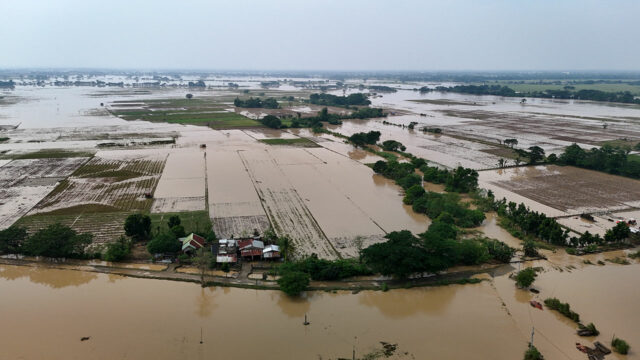PHILIPPINE economic growth was expected to have quickened in the fourth quarter of 2024, driven by strong consumer spending during the holiday season, although the full-year print likely fell short of the government target, a BusinessWorld poll showed.
Gross domestic product (GDP) in the October-to-December period likely grew by 5.8% from a year earlier, accelerating from the 5.2% growth in the third quarter, according to the median forecast of a BusinessWorld poll of 18 economists and analysts last week.
This would match the 5.8% expansion in the fourth quarter of 2023.

At the same time, the BusinessWorld poll yielded a median estimate growth of 5.7% for 2024, below the Development Budget Coordination Committee’s revised 6-6.5% GDP growth goal.
If realized, the growth in 2024 would be faster than the 5.5% print in 2023. This would also be the fastest annual economic growth in two years or since the 7.6% recorded in 2022.
The full-year estimate would also be below the forecasts made by the Asian Development Bank (6%), World Bank (5.9%), International Monetary Fund (5.8%) and ASEAN+3 Macroeconomic Office (5.8%).
The Philippine Statistics Authority (PSA) will release the fourth-quarter and full-year 2024 GDP on Thursday, Jan. 30.
“The economy’s primary growth engine, household consumption, likely continued to rebound from its subdued growth in the first half of last year, supported by lower and stable inflation, a robust labor market, and steady remittance inflows,” Chinabank Research said in an e-mail.
It also noted the series of typhoons “disrupted” economic activities in agriculture, construction, and tourism in the final three months of the year.
Six typhoons battered the Philippines between October and November that resulted in economic losses worth more than P22 billion, according to situational reports by the National Disaster Risk Reduction and Management Council. Broken down, the agency estimated P13.7 billion in infrastructure damage, P7.47 billion in agriculture, and P1.16 billion in irrigation systems.
Security Bank Corp. Vice-President and Research Division Head Angelo B. Taningco said in an e-mail that household consumption likely accelerated due to the holiday season and higher remittance flows.
“On the production side, we observed resilient services activity — underpinned by retail trade, accommodation and food services, and finance — and positive manufacturing growth albeit dragged by sluggish agriculture,” Mr. Taningco said.
Reinielle Matt M. Erece, economist at Oikonomia Advisory and Research, in an e-mail said increased government spending may have been a factor in driving GDP growth in the fourth quarter.
In the 11 months to November, government spending rose by 12.96% to P5.28 trillion, nearly 92% of the revised P5.8-trillion spending program for 2024.
Pantheon Macroeconomics Chief Emerging Asia Economist Miguel Chanco in an e-mail said he expects only a “modest bounce” in the fourth-quarter GDP growth to 5.4%.
“This should be driven to a large extent by a bounce in government spending growth, where base effects are quite favorable. To be sure, the economy, on the whole — bar exports — appear to have found some semblance of stability at the end of last year, in terms of sequential quarter-on-quarter momentum,” he said via e-mail.
Mr. Chanco noted the main tailwind for private consumption is that “inflation remains broadly under control and the labor market is still in fairly decent shape.”
Consumer prices in the final three months slightly crept up. Inflation in October picked up to 2.3%, then to 2.5% in November before accelerating to a four-month high of 2.9% in December.
Average inflation reached 3.2% in 2024.
Nicholas Antonio T. Mapa, chief economist at Metropolitan Bank & Trust Co., said inflation data were a “positive surprise” in 2024, saying that it was below forecasts.
Ruben Carlo O. Asuncion, chief economist at Union Bank of the Philippines, said in an e-mail that private construction may have contributed to the drag in fourth-quarter growth.
“Hefty two-digit vacancy rates in residential and office/commercial space segment, while supply/inventory of middle-market condominium units is equivalent to almost three years (34 months), according to local real estate analysts,” Mr. Asuncion said.
He also noted the total ban on Philippine Offshore Gaming Operators “weighed on the other services segment of the services sector and the administrative and support services.”
Sarah Tan, economist at Moody’s Analytics, said “poor” external conditions in the fourth quarter affected electronics exports that weighed on overall export growth.
“Despite the upturn in the global tech cycle, which has signaled strong demand for advanced semiconductors, the Philippines is being left out in the cold,” Ms. Tan said in an e-mail.
Preliminary data from the PSA showed the country’s merchandise trade deficit widened to a two-year high of $54.21 billion last year as imports picked up while exports continued to drop.
Electronic products, which accounted for close to 40% of total exports last year, dropped by 6.7% to $39.08 billion. Semiconductors, which made up the bulk of electronic products, contracted by 13.5% to $29.16 billion.
On the imports side, electronic products inched up by 2.7% to $27.37 billion last year, while semiconductors slid by 1.8% to $18.5 billion.
OPTIMISM
Meanwhile, many economists and analysts are optimistic on the Philippine economic outlook for this year.
“We expect the Philippine economy to maintain its upward growth trajectory this year on the back of improving consumption and investments due to the outlook for stable, within-target inflation, and lower borrowing costs,” Chinabank Research said.
“A higher government budget this year, along with sustained infrastructure spending, will also support growth,” it added.
Sun Life Investment Management and Trust Corp. economist Patrick M. Ella said he expects GDP to grow by 6.2% this year “on a continued recovery in household consumption and corporates investing in capital outlays at a better clip.”
While Philippine growth missed the target in 2024, Mr. Mapa said this year “could likely be a different story.”
“Growth missed the target as capital formation remains below pre-pandemic levels but 2025 promises to be a better year for the sector thanks to policy easing from the Bangko Sentral ng Pilipinas (BSP). Projected follow-through rate cuts could help support growth further in 2025 and ensure growth finally hits target,” he said.
The BSP began its easing cycle in August last year, delivering a total of 75 bps worth of cuts to bring the benchmark rate to 5.75%. — Kenneth H. Hernandez













